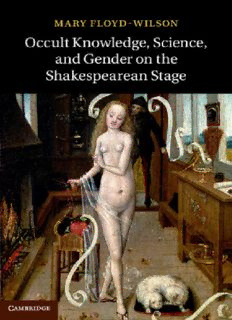
Occult Knowledge, Science, and Gender on the Shakespearean Stage PDF
Preview Occult Knowledge, Science, and Gender on the Shakespearean Stage
OCCULT KNOWLEDGE, SCIENCE, AND GENDER ON THE SHAKESPEAREAN STAGE Beliefinspirits,demons,andtheoccultwascommonplaceintheearly modern period, as was the view that these forces could be used to manipulate nature and produce new knowledge. In this ground- breakingstudy,MaryFloyd-Wilsonexploresthesebeliefsinrelation to women and scientific knowledge, arguing that the early modern Englishunderstoodtheiremotionsandbehaviortobeinfluencedby hidden sympathies and antipathies in the natural world. Focusing on Twelfth Night, Arden of Faversham, A Warning for Fair Women, All’sWellThatEndsWell,TheChangeling,andTheDuchessofMalfi, she demonstrates how these plays stage questions about whether women have privileged access to nature’s secrets and whether their bodies possess hidden occult qualities. Discussing the relationship between scientific discourse and the occult, she goes on to argue that, as experiential evidence gainedscientific ground,women’spre- sumed intimacy with nature’s secrets was either diminished or demonized. mary floyd-wilson is Associate Professor of English and Comparative Literature at the University of North Carolina at Chapel Hill. A recipient of a National Humanities Center Fellowship, she is the author of English Ethnicity and Race in Early Modern Drama (2003) and the co-editor of Reading the Early ModernPassions:ACulturalHistoryofEmotions(withGailKernPaster and Katherine Rowe, 2004) and Embodiment and Environment in Early Modern England (with Garrett A. Sullivan, Jr., 2007). She has published articles in Shakespeare Quarterly, English Literary Renaissance, Early Modern Literary Studies, and Shakespeare Studies, andhasco-editedaspecialissueofRenaissanceDrama. Frontispiece Titlepagewoodcut,Dehumanicorporisfabricalibrorumepitome(Basel,1543), WellcomeLibrary,London OCCULT KNOWLEDGE, SCIENCE, AND GENDER ON THE SHAKESPEAREAN STAGE MARY FLOYD-WILSON cambridge university press Cambridge,NewYork,Melbourne,Madrid,CapeTown, Singapore,SãoPaulo,Delhi,MexicoCity CambridgeUniversityPress TheEdinburghBuilding,Cambridgecb28ru,UK PublishedintheUnitedStatesofAmericabyCambridgeUniversityPress,NewYork www.cambridge.org Informationonthistitle:www.cambridge.org/9781107036321 ©MaryFloyd-Wilson2013 Thispublicationisincopyright.Subjecttostatutoryexception andtotheprovisionsofrelevantcollectivelicensingagreements, noreproductionofanypartmaytakeplacewithoutthewritten permissionofCambridgeUniversityPress. Firstpublished2013 PrintedandboundintheUnitedKingdombytheMPGBooksGroup AcataloguerecordforthispublicationisavailablefromtheBritishLibrary LibraryofCongressCataloguinginPublicationdata Floyd-Wilson,Mary. Occultknowledge,science,andgenderontheShakespeareanstage/MaryFloyd-Wilson. pages cm Includesbibliographicalreferencesandindex. isbn978-1-107-03632-1 1. Shakespeare,William,1564–1616–Criticismandinterpretation. 2. Occultismin literature. 3. Literatureandspiritualism. 4. Womeninliterature. I. Title. PR2965.F56 2013 822.303–dc23 2012050275 isbn978-1-107-03632-1Hardback CambridgeUniversityPresshasnoresponsibilityforthepersistenceor accuracyofURLsforexternalorthird-partyinternetwebsitesreferredto inthispublication,anddoesnotguaranteethatanycontentonsuch websitesis,orwillremain,accurateorappropriate. To Madeline, my darling daughter and my sympathetic twin Contents Listofillustrations page viii Acknowledgments ix Introduction:secretsympathies 1 1 Women’ssecretsandthestatusofevidenceinAll’sWellThat EndsWell 28 2 SympatheticcontagioninArdenofFavershamandAWarning forFairWomen 47 3 “Assecretasmaidenhead”:magneticwombsandthenature ofattractioninShakespeare’sTwelfthNight 73 4 TragicantipathiesinTheChangeling 91 5 “Tothinkthere’spowerinpotions”:experiment,sympathy, andthedevilinTheDuchessofMalfi 110 Coda 130 Notes 138 Bibliography 201 Index 231 vii Illustrations Titlepagewoodcut,Dehumanicorporisfabricalibrorum epitome(Basel,1543),WellcomeLibrary,London frontispiece 1 Receiptforstoppingbleeding.Englishmedicalnotebook, seventeenthcentury,WellcomeLibrary,London page 13 2 OperadiGiorgioAgricoladel’artedemetalli(Basel,1563),Rare BookCollection,WilsonLibrary,UniversityofNorthCarolina atChapelHill 118 viii Acknowledgments Initial thoughts about this project began, appropriately enough, in a domesticspace,whereIwonderedhowmyASsonfalteredoverinterpreting affect but responded so profoundly and viscerally to the circulating emo- tionsaroundhim.Myfirststabatanargumentreceivedmagnanimousand magical feedback from Mary E. Fissell. Her exceptional insights on early moderncultureinformmanyofthecentralthemesofthisbook.Ialsothank my fellow participants in Mary’s colloquium “Vernacular Health and Healing,” held at the Folger Institute, especially Bella Mirabella and Rebecca Totaro. For their kind and encouraging support of this project in its preliminary stages, Steven Mullaney, Mary Thomas Crane, and Phebe Jensen have my sincere gratitude. The audiences at Utah State University, Northwestern University, the University of Michigan, the Renaissance Gothic Conference in Cologne, the University of Melbourne, and the University of Warwick all posed crucial questions that sent me in exciting and productive directions. The conversations in Lorraine Daston’s faculty seminar “Observation” held at the Folger Institute also helped shape my thinking about early modern science in instrumentalways. Thisprojectwouldneverhavereachedcompletionwithoutthesupport of two important institutions and communities: the University of North Carolina at Chapel Hill and the National Humanities Center in Research TrianglePark.InadditiontoafellowshipprovidedbytheInstituteofArts and Humanities, which gave me time to frame some early research ques- tions,theUniversityofNorthCarolinahonoredmewithaW.N.Reynolds LeaveaswellasadepartmentalResearchandStudyLeaveatvitalstagesin thewritingprocess. My year as the John G. Medlin Fellow at the National Humanities Centerwasatransformativeexperience.Iamhappilyindebtedtomyfellow fellows, especially Elizabeth “Cassie” Mansfield, Colin Bird, Jessica Brantley, John M. Doris, Sarah Farmer, Holly Brewer, and Andrew ix
Description: